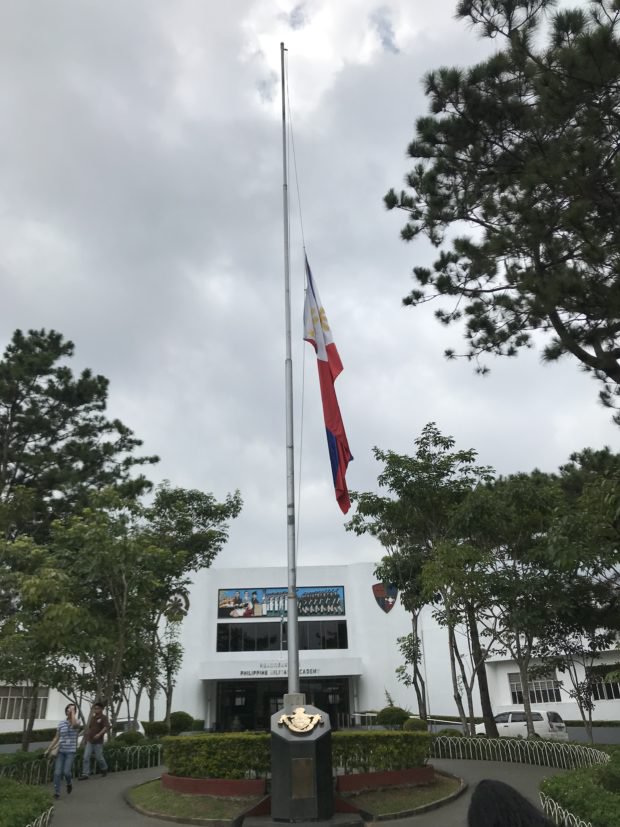BAGUIO CITY—Two more cadets have been added to the list of suspects in the hazing death of Cadet 4th Class Darwin Dormitorio after police learned that a second group of upperclassmen was involved in the maltreatment of the 20-year-old plebe at the Philippine Military Academy (PMA).
Baguio police disclosed on Thursday that the injuries sustained by Dormitorio, who died at the PMA Station Hospital on Sept. 18, included taser burns inflicted by a group of cadets other than the upperclassmen who beat him up over misplaced boots.
Police Col. Allen Rae Co, Baguio City police chief, told a news conference that Dormitorio, who was diagnosed with urinary tract infection at the hospital on Sept. 17, was visited in his quarters by the new suspects, who beat him up and tasered him.
Stun device
A taser is a stun device that discharges electricity. It is used to incapacitate suspects.
An affidavit submitted to the Baguio police describes the taser used on Dormitorio as a “Police 1000 kv unit.”
Police Brig. Gen. Israel Ephraim Dickson, Cordillera police director, who was at the news conference, said it was not yet known why the new suspects beat up the plebe.
“We have yet to interview the suspects so we don’t know yet what prompted them to [beat up Dormitorio],” Dickson said.
The new suspects were not named during the news conference, as the information had yet to be reviewed by the office of the Baguio prosecutor.
No conspiracy
Co said police investigators were consolidating the evidence provided by 12 cadets and two tactical officers as witnesses.
So far, he said, there is no indication of a conspiracy to harass Dormitorio, a son of a retired Army officer who was also a graduate of the PMA.
Co said police investigators had yet to determine if the two groups of suspects were also responsible for the injuries suffered by three cadets who were hospitalized in Manila.
Dormitorio died early on Sept. 18. A police autopsy showed he died from internal injuries caused by blunt force trauma.
A PMA investigation report concluded that he was “maltreated” by three upperclassmen, who are now detained and about to be expelled from the academy.
The three suspects were identified as Cadet 1st Class Ray Sanupao and Cadets 3rd Class Shalimar Imperial and Felix Lumbag.
Citing the investigation report at a news conference on Tuesday, Brig. Gen. Bartolome Bacarro, PMA commandant of cadets, said Imperial and Lumbag beat up Dormitorio on orders from Sanupao, owner of the boots that the plebe had misplaced.
New officials
Bacarro and the PMA superintendent, Lt. Gen. Ronnie Evangelista, resigned on Tuesday after the completion of the school’s investigation.
Bacarro was replaced on Thursday by Army Brig. Gen. Romeo Brawner.
Rear Adm. Allen Cusi, vice commander of the Philippine Navy, will take the place of Evangelista next week
Dormitorio was buried with military honors in Cagayan de Oro City, his hometown, on Wednesday.
The PMA was represented at the funeral by Col. Claro Unson, deputy dean of academics at the country’s premier military school.
Hazing not allowed
Talking to reporters, Unson belied claims of a prevailing “culture of retaliation” among senior students who were hazed when they were freshmen.
“As far as we are concerned, [hazing] is not happening” at the PMA, Unson said, explaining that the maltreatment of cadets was done behind the backs of school officials.
“Actually, most of the cases [of maltreatment] were not planned. Maybe these [were] spur of the moment. This could be due to orders that were not complied [with], duties that [had] not been attended to,” he said.
“But it [is] never allowed,” he added.
Unson refuted the claim of Sen. Ronald dela Rosa, a graduate of the PMA and former Philippine National Police chief, that his hazing at the academy made him what he is today.
“It is against the law. It should not be done,” Unson said.
Unson, however, admitted that the PMA had fallen short in implementing the antihazing law, as shown by the death of Dormitorio
The plebe’s hazers are facing severe penalty. Under Republic Act No. 11053, which toughened the antihazing law, those found guilty of hazing could be meted out life terms and made to pay P3 million in damages, Unson said. —WITH A REPORT FROM JIGGER J. JERUSALEM
